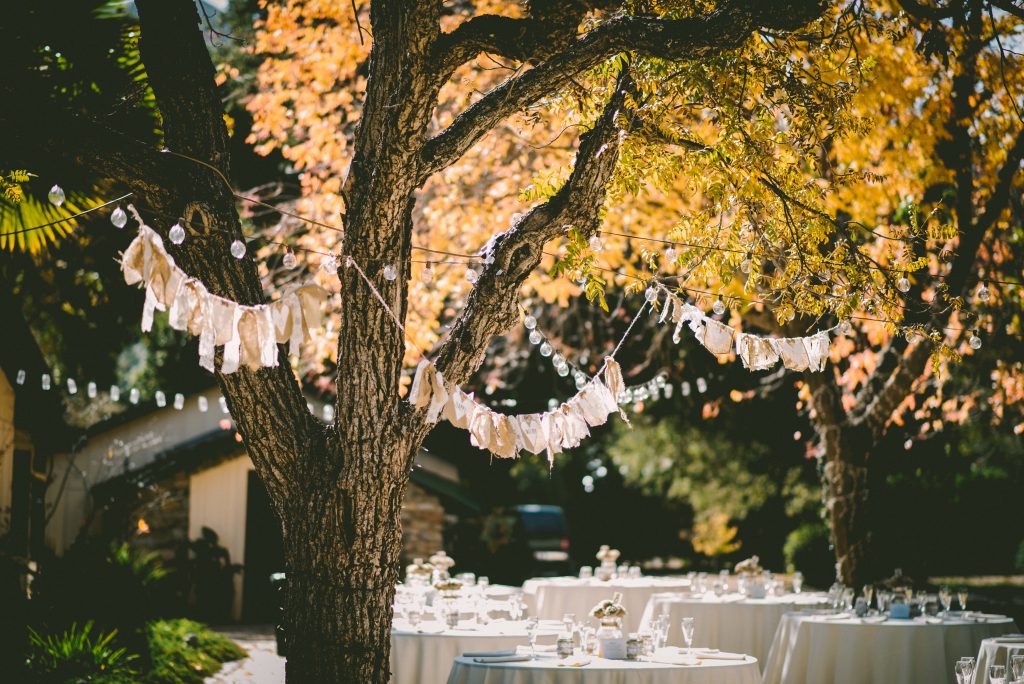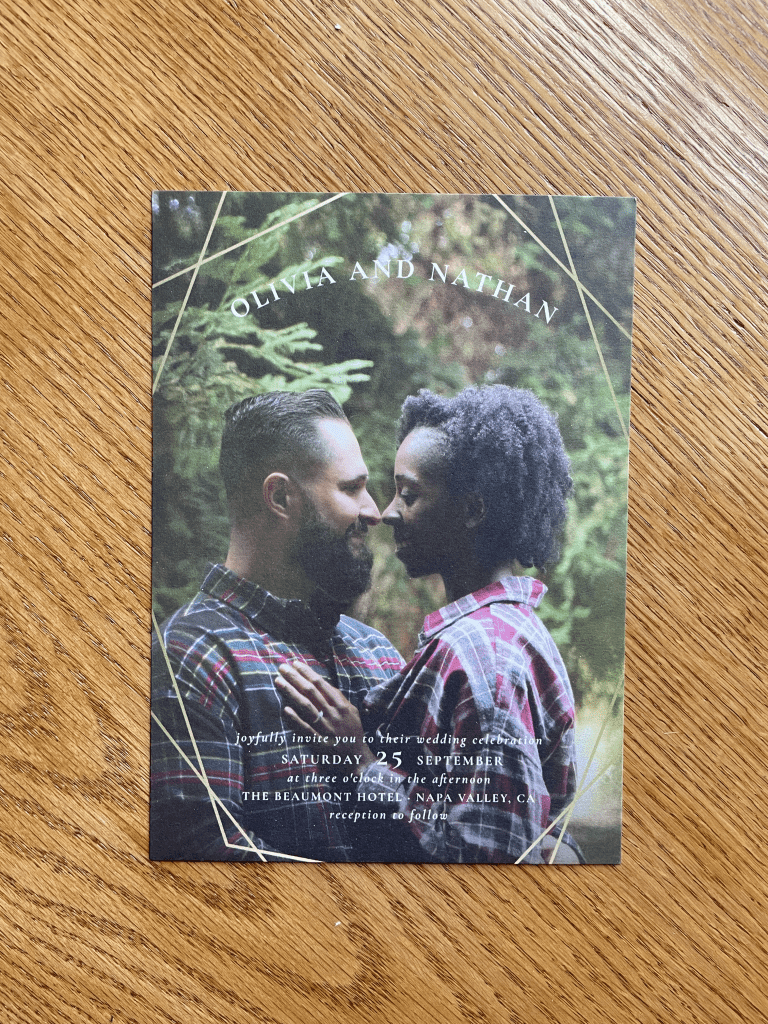
This post contains affiliate links and/or links to my own products. I never recommend anything I don’t love or wouldn’t use myself.
When I planned my wedding in 2017, my soon-to-be husband and I paid for it ourselves. We had a few contributions from our parents for certain things like the rehearsal dinner and the farewell brunch. But mostly, we were planning and funding it with our own money. To make things even more complicated my then fiancé was about to get laid off from his job so we’d be living on one income leading up to the wedding.
Despite the challenges, we were able to plan our dream wedding with money we had saved that was half the cost (or more) of similar weddings our friends were planning. I’m using my experience as a bride to share how to come up with a budget and how to stay on track throughout the wedding process.
How do you come up with a budget for a wedding?
The first steps in coming up with a budget for a wedding is to assess your finances and priorities.
You come up with a budget for a wedding by adding up the money you have saved, what money you could save or earn with a side job per month leading up to the wedding, and family contributions. Then you weigh this number against your assumed guest list and average costs for your area.
By looking at your finances in this way, you’ll see how much money you have to spend between all of the various funding sources available to you. This will be your maximum budget for both the wedding and the honeymoon.
Then you take a look at your priorities for the wedding. Do you want it big or small? Do you want to splurge on your attire or making things more fun and comfortable for your guests? Do you want to spend on decor or a honeymoon? What aspects of the wedding will you remember for the next fifty years and what will you forget about a month later?
Sitting down to have a “money date” as Tori Dunlap calls these conversations, can be truly eye opening and the easiest way to go into your budgeting with clarity. Suddenly, you know what you need to save on and what you’re willing to pay for or even splurge on. And it becomes a lot easier to stay on track when all of the quotes you’re getting seem to be out of budget. Or you’re tempted to just say “‘eff it” and put it all on a credit card with 24% interest.
For my wedding, we prioritized the guest experience, photography, and our honeymoon. That meant we needed to compromise on the number of guests invited, how much I spent on my dress, the florals, and the location of the wedding. In turn, we were able to spend more on getting the perfect venue and catering, our photographer, transportation to and from the venue, entertainment, and our 12-day honeymoon trip to Italy.
Pick 2-3 things that are the priorities for your big day and let go of the rest. To help you with this, I have a budget guide that lets you put in your wedding budget and it suggests what you should spend on each item and how many guests you can afford to invite.
How do people afford to pay for weddings?
Generally people pay for weddings through their own savings, contributions from family, and credit card debt.
I did a poll of over 100 brides and grooms to find out how most people afford to pay for weddings. About XX percent said they used their own savings to pay for their wedding. Which means the majority of people are funding their own weddings based on money they already have. Another XX percent said they were getting some help from family or friends. And XX percent they were putting it on a credit card.
I am not a financial professional but I’m generally good with money and budgeting. My best advice to you is to not go into debt for your wedding. Most professionals advise you to use debt to finance assets, not liabilities. Your wedding day and honeymoon are not assets. They don’t generate income or equity for your net worth. Financing liabilities is the quickest way to find yourself in a dire financial situation.
If you do decide to use a credit card, find one with a no interest period that you can reasonably pay off before the interest kicks in. Or only use your card as an intermediary step to earn rewards points before paying it off in full with cash you already have saved.

How many guests can you afford at your wedding?
Your guest count is one of the biggest factors in how much your wedding is going to cost. Some of the biggest costs are variable and directly tied to how many people you invite. I go into way more detail on why this is in my post about how much weddings cost per person.
And I built you a tool to easily determine the number of guests you should have at your wedding based on your budget. You can sign up for free access to the budget guide below:
What are your wedding priorities?
I mentioned the importance of identifying your wedding priorities earlier in this post but let’s go a little bit deeper into the types of priorities you might have and questions you can ask each other to pick 2-3 priorities to focus on.
Spending for a wedding can be broken down into three categories – what’s important to you, what’s important to your family, and what’s important to your guests.
What’s important to you
Items that may be important to you but don’t really affect anyone else attending the wedding are:
- your attire
- the decorations and florals (as much as you tell yourself this is part of guest experience, I promise your family and friends don’t really care)
- the honeymoon
- the bachelor/bachelorette parties
- the rings
- photography / videography
Pick one of the items above to be the thing you’re willing to spend or even splurge on because you want it to be perfect. And allow yourself to compromise on everything else if it doesn’t fit within your budget. If you’re having a hard time picking just one, then create a ranked list so you know what’s near the top and what’s near the bottom.
What’s important to your family
Whether or not your family is financially contributing to the wedding, you’ll want to consider some of the things that are important to them. From their point of view, they raised you and supported you as a couple. This is a chance for them to celebrate their baby growing up with all of their family and friends. And if they gave you money towards your wedding, they may feel strongly about getting a say. Here are some items that are typically important to families:
- religious ceremony
- location of the venue
- guest list
- guest experience
- their appearance (including hair and makeup)
- family photos
- invitation etiquette
- getting a “good deal” from vendors
Depending on the personalities involved here, this area can be the MOST difficult and stressful part of wedding planning. I’ll go into more detail on how to manage this situation next.
What’s important to your guests
Here are the common items that affect your guests:
- Good and plentiful food options
- Open bar
- Temperature of each space
- Dress code
- Parking
- Hotel accommodations
- Transportation to and from the venue
- Location
- Ceremony length
- Gaps in the day of timeline
- Who they are seated next to for dinner
Prioritizing guest experience overall is something you should value where you can afford to. It’s better to have a smaller wedding and treat your guests to a better time than a larger wedding where everyone is too hot and hungry and they had to drive two hours to an area without any hotel or transportation options. I’ve been to over two dozen weddings and I still remember which ones were miserable for the guests.

How to manage contributions from family and friends
Managing contributions from family and friends can be a delicate and stressful situation. Luckily my own parents and in-laws didn’t have strong opinions on our wedding planning and their contributions went towards specific items in the budget. I’ve talked to a number of brides and grooms over the past few years that had a harder time managing their parents’ expectations and opinions.
If your parents or anyone else in your community is funding part or all of your wedding, make sure you understand what strings are attached with the money. Have a friendly conversation in the early stages of your budgeting. Ask them what their priorities are and show them how much things are expected to cost. (There will be a lot of eyebrows raised over this since prices have jumped way beyond inflation in the last 30 years.)
Do your best to assign their funds to specific items on the budget that align with their priorities and what you don’t mind losing a little control over.
I can’t stress enough how setting this boundary early on will save you so much conflict and strife throughout the process. It’s the number one mistake I see other couples making when accepting money from others.
If this discussion can’t be had an agreeable way with reasonable compromises on both sides, then don’t accept the money. It’s going to make you miserable to have the wedding someone else wants just because they’re able to pay. You’re better off having a smaller wedding that makes you happy and you can afford on your own.
Here’s an example of what that looks like:
If your parents and his parents are contributing an even amount of money that equals 80% of your budget and you’re funding the rest, assign those funds accordingly. Maybe each set of parents is paying for their half of the guest list for venue and catering, alcohol, and cake costs. And then you assign some other items to each, like the dress to your mom and the photographer to your in-laws. And some items to yourselves like the flowers and invitations. That means no one family can add way more guests than the other or threaten that if you don’t choose the flowers, invitations, and bachelor / bachelorette destination they prefer they won’t pay for it. It also means you’re willing to involve them in the decisions for those items and fund any extras you want that they don’t.
With this approach they know what they’re paying for and what they have a say in upfront. If they want certain extras along the way, it’s coming out of their funds and no one else’s. And you can safely not involve them in the decisions that don’t affect their wallet if you don’t want additional opinions there.
How to save money on the dress
Saving on your wedding dress can be a great way to manage your budget. You don’t need to spend on luxury materials to get a dress that looks great in photos. The best way to save money on your wedding dress is to buy a second-hand dress or one off-the-rack. I have an entire article dedicated to what an off-the-rack dress is and how it saves you money.
How to save money on the venue
The venue is usually one of the largest investments you’ll make in your wedding so saving money here can make a big difference on your overall budget. The best ways to save are to choose a location that has a lower average wedding cost or to choose an off time for your wedding to take advantage of off peak package discounts. Here are a few articles that go into this in more detail:
- The Cheapest Months to Get Married
- Weekday Wedding Tips
- Pros and Cons of Friday Weddings
- Pros and Cons of Sunday Weddings
- Pros and Cons of Afternoon Weddings
How to save money on a DJ
Hiring a DJ itself can be a way to save money since a live band or musicians can usually cost you more money than a DJ. But if you’re looking to save even more, you can look into these DJ alternatives or how to play Spotify at your wedding.
How to save money on a florist
A hack I used myself is to set a budget that you can afford and go to your florist with that budget in mind. I was able to save by only purchasing one bouquet for myself, choosing a statement flower for my bridesmaids, and using minimalistic greenery everywhere else. It helped that our ceremony and reception locations were already beautiful spaces on their own and didn’t need much additional decor.
You can also look into getting your flowers at a farmer’s market or grocery store the morning of your wedding, using artificial flowers like Sola wood flowers, or even splitting the cost of artificial flowers with another bride who has a different date and similar color scheme.

How to save money on invitations
I have so many articles on saving money on your invitations that I’ll link to below. As a stationery designer, I have a lot of experience in what materials cost and where to get the best deals.
One of my favorite tips to cut down on costs is to use an affordable wedding stationery option. Zazzle has some of the best quality and beautiful designs for the price. You can check out my favorite styles on Zazzle here. And don’t forget to check out my review of Zazzle to see why I recommend them.
Here are a few other articles that dive deep into the topic of wedding invitation costs:
- How to make your invitations look expensive
- Best wedding invitations for the price
- Cheapest way to do wedding invitations
- How to save money on your wedding stamps
How to get paid for planning your wedding
My last tip is how to get paid while planning your wedding. Did you think that was even possible?
The first is to choose an interest free credit card that will give you the best rewards points for cash redemption or travel miles. Depending on your budget just by using a card as an intermediary step between playing for the items in cash, you could fund your entire honeymoon flights or pay for the more expensive photographer or any other extras that would add to your wedding experience.
The second is to consider ways to make money from the skills you learn during the wedding planning journey. For example, I designed my first wedding invitation for my own wedding and researched printing options that would cost less than many of the traditional wedding invitation companies. Not only did I save money on my own invitations but I also learned a valuable side hustle skill that has paid me multiple times over the cost of my wedding. If you’re at all crafty or artsy, doing some DIY on your own wedding can help you save money and develop a fun paying hobby that could eventually pay for your wedding entirely.
I have even more ideas on how to make money off of your wedding, instead of losing money, here.
In Conclusion
I have a number of other articles designed to help you plan your wedding on a budget and stay on track. Here is some recommended reading at different size wedding guest lists and budget levels to check out next:

